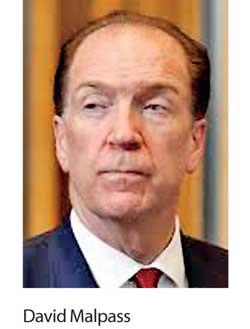20 Mar 2020 - {{hitsCtrl.values.hits}}
The World Bank has increased the fast-track financing package by US$2 billion to US$14 billion, to assist companies and countries in their efforts to prevent, detect and respond to the rapid spread of COVID-19.
The World Bank and International Finance Corporation (IFC) director boards approved the additional funding to the package on Tuesday.

Consequently, IFC will increase its COVID-19 related financing availability to US$8 billion as part of the US$14 billion package, up from an earlier US$ 6 billion, to support private companies and their employees hurt by the economic downturn caused by the
COVID-19 spread.
The multibillion dollar package is aimed at strengthening national systems for public health preparedness, including for disease containment, diagnosis, and treatment, and support for the private sector.
The bulk of the IFC financing will go to client financial institutions to enable them to continue to offer trade financing, working-capital support and medium-term financing to private companies struggling with disruptions in supply chains.
IFC’s response would also support existing clients in economic sectors directly affected by the pandemic, in particular tourism and manufacturing sectors to continue to pay their bills. The package will also benefit sectors involved in responding to the pandemic, including healthcare and related industries, which face increased demand for services, medical equipment and pharmaceuticals.
“It’s essential that we shorten the recovery time. This package provides urgent support to businesses and their workers to reduce the financial and economic impact of the spread of COVID-19,” said World Bank Group President David Malpass.
The additional US$2 billion builds on the announcement of the original response package on March 3, which included US$ 6 billion in financing by the World Bank to strengthen health systems and disease surveillance and US$6 billion by IFC to help provide a lifeline for micro, small and medium sized enterprises, which are more vulnerable to economic shocks.
IFC also plans to provide funding to emerging market banks to extend credit to help businesses shore up their working capital, which would help those firms to pay their bills and compensate workers.
Further, a new component initiated at the request to draw US$ 2 billion from the Global Trade Liquidity Programme, and the Critical Commodities Finance Programme, both of which offer risk-sharing support to local banks so they can continue to finance companies in emerging markets.
Since 1956, IFC has invested over US$ 1.3 billion across sectors, including financial, infrastructure, telecom, tourism, energy and health in Sri Lanka.
16 Nov 2024 1 hours ago
16 Nov 2024 2 hours ago
16 Nov 2024 2 hours ago
16 Nov 2024 3 hours ago
16 Nov 2024 4 hours ago